Select Language
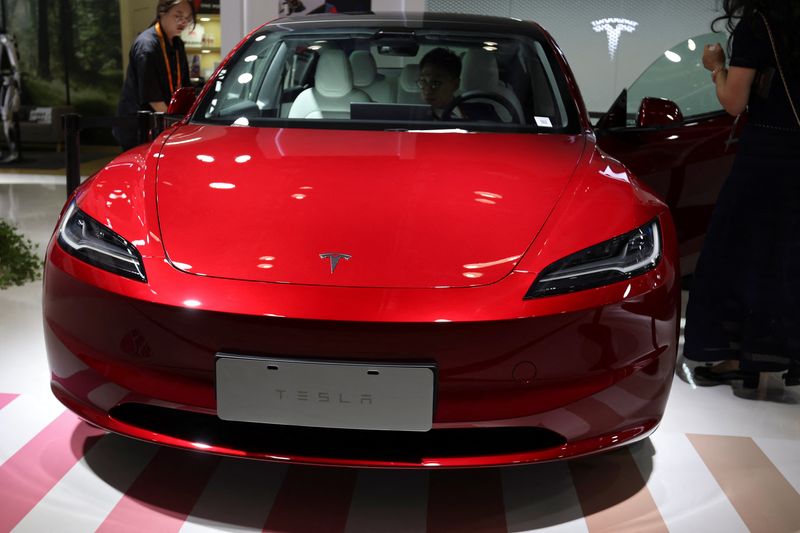
BEIJING (Reuters) -U.S. electric vehicle maker Tesla (NASDAQ:TSLA) said on Friday its China sales rose 8.8% to a record high of more than 657,000 cars in 2024, a strong performance in a competitive market in a year when its annual global deliveries fell for the first time.
Tesla's sales in the world's largest auto market also increased 12.8% in December from a month earlier to a record high of 83,000 units, according to Tesla China.
In 2024, Tesla delivered 36.7% of its cars to customers in China, its second-largest market, based on the sales figures.
But global deliveries nonetheless slid 1.1%, missing CEO Elon Musk's earlier prediction of slight growth. Reduced European subsidies, a U.S. shift toward lower-priced hybrid vehicles and tougher global competition, especially from China's BYD (SZ:002594), were a drag on sales.
With full-year global sales of 1.79 million cars, Tesla was still narrowly ahead of BYD, whose EV sales grew 12.1% to 1.76 million globally.
The U.S. EV giant downsized its global workforce last year in the face of tepid demand and stiffer competition from Chinese EV makers, and cut the size of its China sales team.
As an EV price war in China enters a third year, Tesla has extended a 10,000 yuan ($1,369.99) discount on outstanding loans for its best-selling Model Y as well as zero-interest financing of up to five years for some Model 3 and Model Y cars until the end of this month.
BYD, which has led a cost-cutting competition with its Dynasty and Ocean series of EVs and plug-in hybrids, overshot its sales target, with passenger vehicle sales up 41% to over 4.25 million units last year.
The Chinese EV champion's overseas shipments rose 71.9% to 417,204 units, or 9.8% of its global sales, missing its export target of 450,000 for 2024, as it faces a 17% additional tariff, the lowest the EU has assigned Chinese EVs from China.
Nearly one out of five BYD cars sold out of China was in Brazil, where BYD and its contractor Jinjiang Group are facing investigations by Brazilian authorities into the conditions of the Chinese workers at the construction site of a local BYD factory.

WASHINGTON (Reuters) - U.S. mortgage rates jumped to a six-month high this week, suggesting that a recent improvement in home sales could be temporary.
The average rate on the popular 30-year fixed-rate mortgage increased to 6.91%, the highest level since early July, from 6.85% last week, mortgage finance agency Freddie Mac (OTC:FMCC) said on Thursday. It averaged 6.62% during the same period a year ago.
"Compared to this time last year, rates are elevated and the market's affordability headwinds persist," said Sam Khater, Freddie Mac’s Chief Economist.
Mortgage rates have trended higher despite the Federal Reserve cutting interest rates three times since starting its monetary policy easing cycle in September.
They have risen in tandem with U.S. Treasury yields amid a resilient economy and investor fears that President-elect Donald Trump's proposed policies, including tax cuts, higher tariffs on imported goods and mass deportations, could reignite inflation.
Mortgage rates track the 10-year Treasury note. Sales of previously owned homes surged to an eight-month high in November, mostly reflecting contracts signed in October and possibly September when mortgage rates were mostly lower.
Sales could still rise in December after contracts increased to a 21-month high in November. Increased supply is pulling more buyers into the market, but rising mortgage rates could discourage some homeowners from putting their houses on the market, especially if they would need to buy another home.
Many homeowners have mortgages below 5%. The so-called rate-lock effect could mean fewer homes being listed, reducing inventory and pushing up prices.
This would combine with rising mortgage rates to reduce affordability for many prospective buyers.
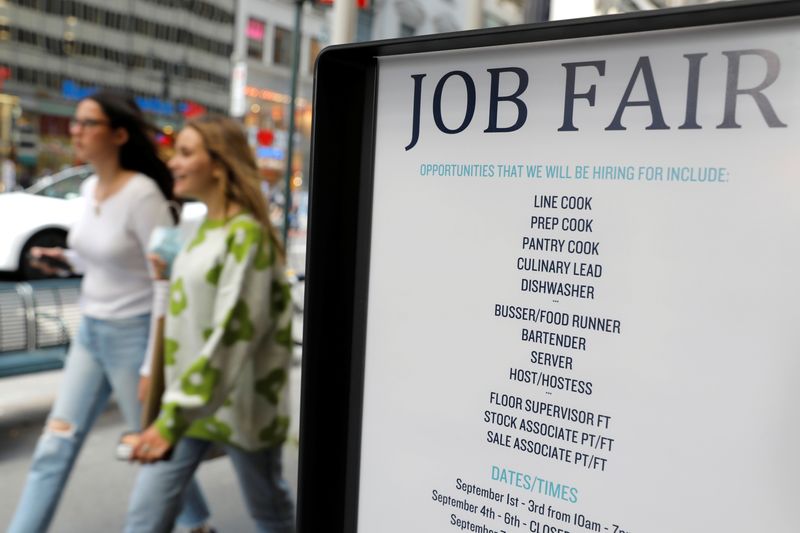
By Lucia Mutikani
WASHINGTON (Reuters) -The number of Americans filing new applications for unemployment benefits dropped to an eight-month low last week, pointing to low layoffs at the end of 2024 and consistent with a healthy labor market.
The report from the Labor Department on Thursday added to a recent raft of upbeat economic data, including consumer spending, in reinforcing the Federal Reserve's projections for fewer interest rate cuts this year. Labor market resilience is keeping the economic expansion on track.
"A stable job market will squelch the Fed's appetite for cutting rates aggressively amid nagging services inflation," said Jeffrey Roach, chief economist at LPL Financial (NASDAQ:LPLA).
Initial claims for state unemployment benefits dropped 9,000 to a seasonally adjusted 211,000 for the week ended Dec. 28, the lowest level since April. Economists polled by Reuters had forecast 222,000 claims for the latest week.
There were sharp declines in unadjusted claims in California and Texas. Large increases in filings were recorded in Michigan, New Jersey, Pennsylvania, Ohio, Massachusetts and Connecticut.
Claims tend to be volatile around the end of the year. Through the volatility, however, they have remained compatible with a labor market that is steadily slowing at a pace that does not signal a deterioration in economic conditions.
The four-week moving average of claims, which strips out seasonal fluctuations from the data, fell 3,500 to 223,250.
The dollar rose to a two-year high against a basket of currencies, while stocks on Wall Street were slightly stronger. Yields on longer-dated U.S. Treasuries edged higher.
CONSTRUCTION SPENDING UNCHANGED
The U.S. central bank last month delivered a third consecutive interest rate cut, lowering its benchmark overnight interest rate by 25 basis points to the 4.25%-4.50% range.
It, however, projected only two reductions in borrowing costs this year compared to the four it had forecast in September, acknowledging the resilience of the jobs market and economy. The Fed's policy rate was hiked by 5.25 percentage points in 2022 and 2023 to quell inflation.
The labor market is being underpinned by very low levels of layoffs, but employers are hesitant to add more workers after a hiring spree during the recovery from the COVID-19 pandemic.
As a result, some workers who have lost their jobs are experiencing long bouts of joblessness, with the median duration of unemployment approaching a three-year high in November.
The number of people receiving benefits after an initial week of aid, a proxy for hiring, decreased 52,000 to a seasonally adjusted 1.844 million during the week ending Dec. 21, the claims report showed.
The so-called continuing claims continued to rise in Washington state, long after a strike by factory workers at Boeing (NYSE:BA) ended. They remained elevated in North Carolina in the aftermath of the devastation caused by Hurricane Helene, and in Michigan and Ohio, which have suffered job losses in manufacturing.
Economists have also attributed some of the continued elevation in the so-called continuing claims to difficulties stripping out seasonal fluctuations from the data. They expect the unemployment rate to have held steady at 4.2% in December.
The government is scheduled to publish its closely watched employment report for December next Friday.
"Businesses hired fewer employees in 2024 than they did in 2023 and 2022, leading to the persistent increase in continuing claims in 2024," said Stuart Hoffman, senior economic advisor at PNC Financial (NYSE:PNC). "But the economy is still creating roughly enough jobs to keep up with labor force growth."
A separate report from the Commerce Department's Census Bureau showed construction spending was unchanged in November as a moderate rise in single-family homebuilding was offset by a sharp decline in outlays on multi-family housing projects. That followed an upwardly revised 0.5% rise in October.
Economists had forecast construction spending would gain 0.3% in November after a previously reported 0.4% rise in October. It increased 3.0% on a year-on-year basis in November.
Spending on private construction projects edged up 0.1% after increasing 0.6% in October. Investment in residential construction nudged up 0.1%, with outlays on new single-family projects rising 0.3%.
New construction could be hampered by higher mortgage rates, President-elect Donald Trump's threat to impose tariffs on imports, and the labor shortages that could result from his incoming administration's broad promise to deport immigrants.
Trump's policy pledges, including tax cuts, have contributed to the elevation in mortgage rates even as the Fed has been lowering borrowing costs.
Outlays on multi-family housing units fell 1.3% in November. Spending on home renovations continued to increase.
Investment in private non-residential structures like offices and factories was unchanged in November.
Spending on public construction projects dipped 0.1% in November after easing by the same margin in October. State and local government spending slipped 0.1%, while outlays on federal government projects dropped 0.5%.
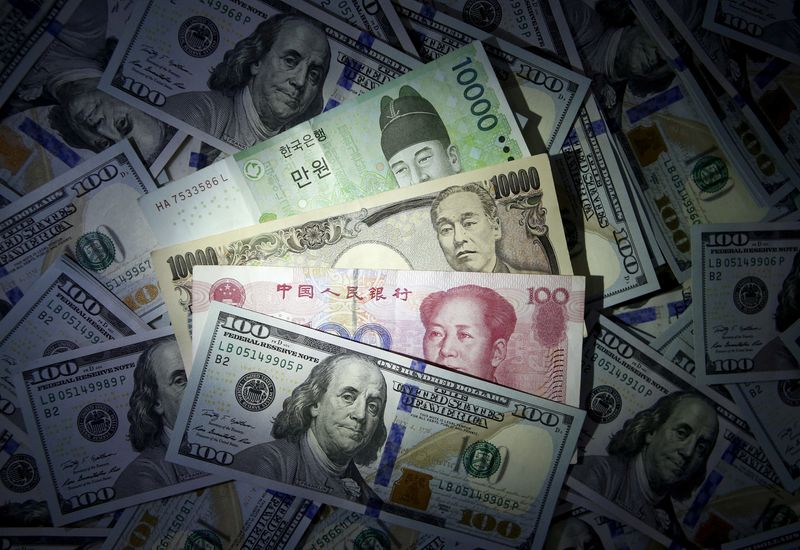
By Karen Brettell
NEW YORK (Reuters) -The U.S. dollar jumped to a two-year high on Thursday in the first day of 2025 trading, building on last year's strong gains on expectations U.S. growth will beat peers and keep U.S. interest rates relatively elevated.
The Federal Reserve has indicated that it will be more cautious in cutting interest rates as inflation remains stubbornly above its 2% annual target and the economy remains strong.
Policies by U.S. President-elect Donald Trump are also expected to boost growth and potentially add to upward price pressures.
"In terms of 2025 economic growth, there's no rival to the dollar," said Adam Button, chief currency analyst at ForexLive in Toronto.
"Capital flows dominate the turn of the year and the U.S. stock market has really put to shame every other global market," Button added. "The dollar is the only game in town until there is a genuine stumble in the U.S. economy."
Data on Thursday confirmed a still solid jobs market. The number of Americans filing new applications for unemployment benefits dropped to an eight-month low last week, pointing to low layoffs at the end of 2024.
The dollar index was last up 0.77% on the day at 109.38.
The euro dropped 1.01% to $1.025, its lowest since November 2022.
The single currency accelerated losses after it broke below the $1.03 level, indicating that technical factors were deepening the sell-off.
Traders anticipate deep interest rate cuts from the European Central Bank in 2025, with markets pricing in at least four 25-basis-point cuts, while not being certain of even two such moves from the Fed.
By Karen Brettell
NEW YORK (Reuters) -The U.S. dollar jumped to a two-year high on Thursday in the first day of 2025 trading, building on last year's strong gains on expectations U.S. growth will beat peers and keep U.S. interest rates relatively elevated.
The Federal Reserve has indicated that it will be more cautious in cutting interest rates as inflation remains stubbornly above its 2% annual target and the economy remains strong.
Policies by U.S. President-elect Donald Trump are also expected to boost growth and potentially add to upward price pressures.
"In terms of 2025 economic growth, there's no rival to the dollar," said Adam Button, chief currency analyst at ForexLive in Toronto.
"Capital flows dominate the turn of the year and the U.S. stock market has really put to shame every other global market," Button added. "The dollar is the only game in town until there is a genuine stumble in the U.S. economy."
Data on Thursday confirmed a still solid jobs market. The number of Americans filing new applications for unemployment benefits dropped to an eight-month low last week, pointing to low layoffs at the end of 2024.
The dollar index was last up 0.77% on the day at 109.38.
The euro dropped 1.01% to $1.025, its lowest since November 2022.
The single currency accelerated losses after it broke below the $1.03 level, indicating that technical factors were deepening the sell-off.
Traders anticipate deep interest rate cuts from the European Central Bank in 2025, with markets pricing in at least four 25-basis-point cuts, while not being certain of even two such moves from the Fed.
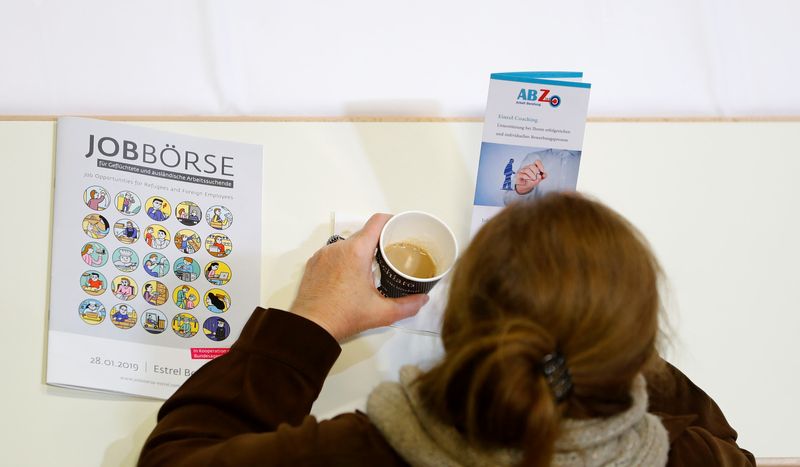
BERLIN (Reuters) - There were roughly 46.1 million people employed in Germany in 2024 on an annual average, the highest number since German reunification, the statistics office said on Thursday.
The average number of people in employment in 2024 rose by 72,000 on the previous year, the statistics office said.
With the exception of the pandemic year of 2020, the number of employed has risen consistently since 2006.
However, the pace of employment growth has slowed considerably since mid-2022, the office said.
The increase of 72,000 people employed in 2024 follows larger rises of 622,000 in 2022 and 336,000 in 2023, data from the statistics office showed.
As in previous years, employment growth in 2024 was due to the immigration of foreign workers and the higher labour force participation of the domestic population.
According to the statistics office, these two contributions offset the dampening effects of demographic change.
The service sector was the only contributor to the increase in the total number of people in employment in 2024, with 75.5% of all employed working in this sector.
In industry, the number of employed fell by 50,000 and the number of workers in construction industry fell by 28,000, data from the statistics office showed.
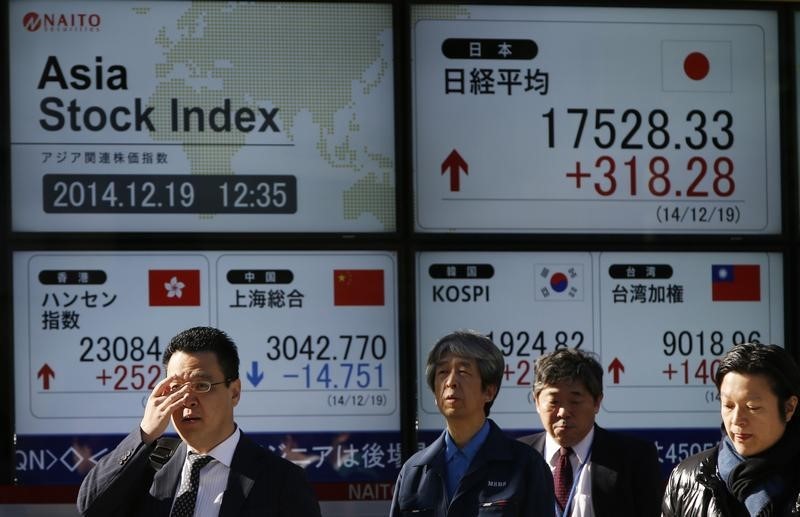
Investing.com– Most Asian stocks were lower on Thursday tracking a subdued year-end performance on Wall Street, while Chinese stocks fell sharply after data showed a slower-than-anticipated rise in the country’s manufacturing activity.
Most major stock markets were closed a day earlier for the New Year holiday. Japanese and New Zealand markets remain shut.
U.S. stock index futures were lower in Asian trade on Thursday, after Wall Street declined at the end of 2024 as a “Santa Rally” largely failed to materialize.
Chinese stocks slump as manufacturing activity slows
China’s Shanghai Shenzhen CSI 300 fell 1.3% on Thursday, while the Shanghai Composite index declined 0.9%.
Chinese manufacturing activity saw weaker-than-anticipated growth in December, according to private purchasing managers' index (PMI) data released on Thursday, suggesting that the impact of recent stimulus measures is waning.
The Caixin PMI results follow government data earlier this week, which also indicated that the manufacturing sector expanded in December but at a pace below expectations.
Markets are holding out for more clarity on Beijing’s plans for stimulus measures in the coming year. Recent reports suggested that the country will ramp up fiscal spending to support economic growth.
Hong Kong’s Hang Seng index slumped 1.7% with China's Sun Art Retail (HK:6808) plunging more than 30% after Alibaba (HK:9988) said it would exit the firm by selling its majority stake for $1.6 billion.
Singapore shares muted after Q4 GDP
Singapore’s Straits Times Index was largely unchanged on Thursday.
Data showed that Singapore's economy experienced minimal growth in the fourth quarter, weighed down by sluggish export demand and slowing growth in China. Although on an annual basis, the economy grew more than 4% in 2024.
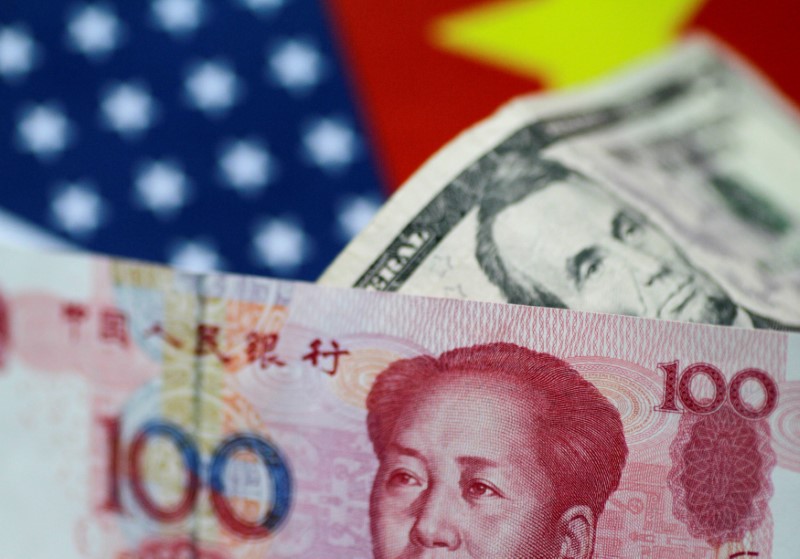
Investing.com-- Most Asian currencies moved in a flat-to-low range on Thursday as the prospect of slower U.S. interest rate cuts in 2025 kept traders averse to regional markets.
The Chinese yuan was among the worst performers for the day as purchasing managers index data showed support from stimulus measures rolled out in recent months was now petering out.
Regional trading volumes were still limited, as major markets such as Japan remained closed for the New Year holidays.
The dollar remained upbeat, benefiting from expectations of a slower pace of rate cuts by the Federal Reserve in 2025, while protectionist policies under incoming President Donald Trump are also expected to favor the greenback.
The dollar index and dollar index futures moved little in Asian trade, but were at their highest levels since November 2022.
Chinese yuan slips as manufacturing PMIs disappoint
The Chinese yuan weakened on Thursday, with the USD/CNY pair rising 0.3% to 7.3190 yuan- its highest level in over a year.
Caixin PMI data showed that the country’s manufacturing sector grew less than expected in December as support from recent stimulus measures ran dry.
The reading came just days after government PMI data also showed weaker-than-expected growth in the manufacturing sector.
The prints ramped up concerns over a slowing economic recovery in China, with recent stimulus measures having provided only limited support. Increased trade headwinds under Trump are also expected to pressure the Chinese economy, although Beijing is expected to dole out more fiscal stimulus to offset this trend.
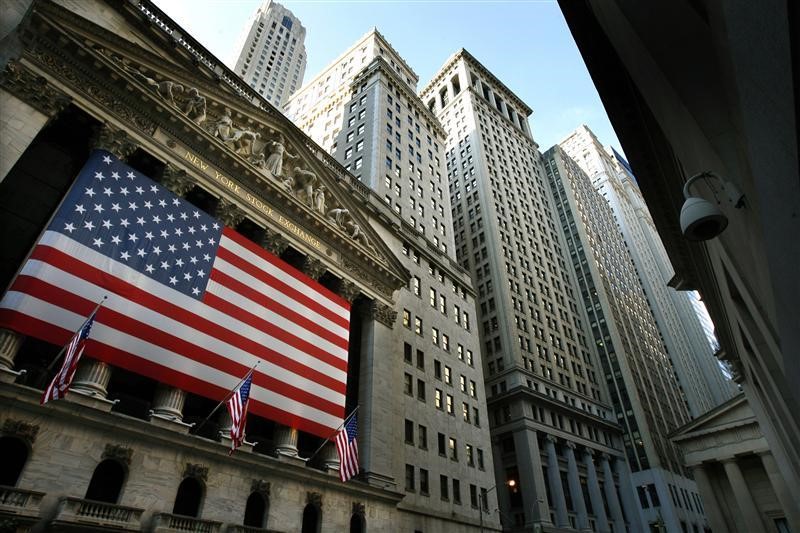
Investing.com-- U.S. stock index futures rose on Wednesday evening, marking a cautious start to 2025 after a mix of artificial intelligence hype and lower interest rates saw equity markets log stellar gains in the past year.
But these gains petered out towards the end of 2024, as a so-called “Santa Rally” largely failed to materialize in late-December. Concerns over a slower pace of interest rate cuts by the Federal Reserve and uncertainty over policy under incoming President Donald Trump saw investors lock in recent profits.
S&P 500 Futures fell 0.1% to 5,927.25 points, while Nasdaq 100 Futures fell 0.1% to 21,213.50 points by 19:13 ET (00:13 GMT). Dow Jones Futures fell 0.2% to 42,809.0 points.
Trading volumes remained thin on account of the year-end holidays, and are expected to only pick up in the coming week.
Sentiment was also rattled by a vehicle attack in New Orleans that killed at least 15, while a Tesla Inc (NASDAQ:TSLA) Cybertruck exploded outside the Trump Hotel in Las Vegas.
Wall Street lags in final trading days of 2024
While Wall Street indexes were sitting on stellar gains through 2024, this momentum largely stalled in the final trading days of 2024, with benchmark indexes marking a flat-to-low performance in December.
The S&P 500 closed down 0.4% at 5,881.60 points on Tuesday, while the NASDAQ Composite fell 0.9% to 19,310.79 points. The Dow Jones Industrial Average fell 0.1% to 42,544.22 points, with all three indexes logging at least three days of consecutive losses.
But they were still trading up substantially for 2024. The Nasdaq rose 28.6%, benefiting the most from an AI-fueled rally in technology stocks. The S&P 500 rose 23.3%, while the Dow added 12.9% in 2024.
Trump policy, Fed rate cuts to take focus in 2025
Trump’s economic and international policies are set to be the biggest point of focus in the coming month, as he takes office later in January.
Trump has vowed to dole out largely expansionary policies, but has also pledged steep trade tariffs against major U.S. trading partners such as China, Canada, and Mexico.
Uncertainty over Trump’s policies saw investors turn cautious in recent weeks, sparking some profit-taking after an initial rally on Wall Street in response to Trump’s election victory in early-November.
Investors also fear that Trump’s policies could keep inflation elevated in the long-term, inviting fewer interest rate cuts by the Fed.
The central bank recently flagged a slower pace of rate cuts in 2025, citing concerns over sticky inflation and a robust labor market.
The Fed’s comments had sparked an extended sell-off on Wall Street, and were a major driver of losses in December.
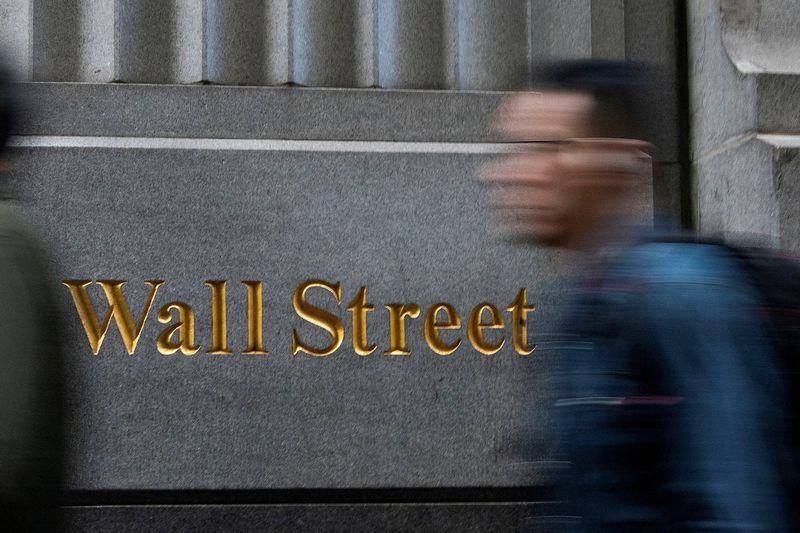
By Lewis (JO:LEWJ) Krauskopf
NEW YORK (Reuters) -Investors are expecting more gains for the U.S. stock market in 2025 after two straight standout years, fueled by a solid economy supporting corporate profits, moderating interest rates and pro-growth policies from incoming President Donald Trump.
The benchmark S&P 500 was up 23.31% in 2024, even with a recent speed bump, marking its second-straight year of gains exceeding 20%, lifted by megacap tech stocks and excitement over the business potential of artificial intelligence.
The index soared 53.19% over the last two years, the biggest two-year percentage jump since 1998.
Investors are more confident about the economy than this time a year ago, with consumers and businesses having absorbed higher interest rates and the Federal Reserve now lowering them - albeit by not as much as hoped. Corporate profits are also expected to be strong, with S&P 500 earnings per share projected to rise 10.67% in 2025, according to LSEG.
On the other side of the ledger, inflation remains stubborn, and Wall Street is wary of a rebound that could lead the Fed to change course on its easing cycle. Indeed, stocks pulled back sharply earlier in December after the central bank projected fewer rate cuts next year as it braced for firmer inflation.
Such prospects could become more likely if Trump implements tariffs on U.S. imports that lead to higher consumer prices. Stock valuations, meanwhile, are around their steepest levels in more than three years, leaving greater potential for turbulence.
"We've been on quite the tear coming off the lows back at the end of 2022. It's been pretty eye-watering," said Garrett Melson, portfolio strategist at Natixis Investment Managers.
"Animal spirits ... are certainly running pretty wild right now, but you might need to temper that a little bit as you start to move through the year," said Melson, who thinks the stock market could still produce solid gains of around 10% in 2025 if not the returns of the prior two years.
Wall Street firms are mostly projecting gains for the market next year, with S&P 500 year-end targets ranging from 6,000 to 7,000 points. The index ended 2024 at 5,881 on Tuesday.
Optimistic investors can point to a bull market that is neither old nor over-extended by historic measures.
The current bull market for the S&P 500 that began in October 2022 is less than half as long as the average length of the 10 prior ones, according to Keith Lerner, co-chief investment officer at Truist Advisory Services. The S&P 500's roughly 64% gain during this latest run trails the 108% median gain and 184% average rise of the prior bull markets, according to Lerner.
"If you zoom out a little bit, yes, we have a lot of gains, but if you look at a typical bull market, it suggests that we still have further gains to go," Lerner said.
Other historic signs also bode well. The S&P 500 has gained an average of 12.3% following the eight instances of back-to-back 20% annual gains since 1950, according to Ryan Detrick, chief market strategist at Carson Group, compared to a 9.3% overall average increase over that time. The index increased six of the eight times.
ECONOMY WEATHERING RATES
Bolstering the upbeat sentiment is the prevailing sense on Wall Street that the economy has weathered the rate hikes the Fed implemented starting in 2022 to quell inflation.
A Natixis Investment Managers survey conducted in recent weeks found 73% of institutional investors said the U.S. will avoid a recession in 2025. That is a sharp turnaround from a year ago, when 62% projected such a downturn in the coming year.
Citigroup (NYSE:C)'s economic surprise index, which measures how economic data performs versus expectations, has been solidly positive for the past two months, another rosy sign for investors.
Adding to expectations of a solid economy, Trump is expected to pursue an agenda that includes tax cuts and deregulation that supports growth.
"We're leaving 2024 on pretty good footing, and we think there is some re-acceleration in 2025," said Sameer Samana, senior global market strategist at Wells Fargo (NYSE:WFC) Investment Institute. "Markets tend to front-run the economy, so they will position for that economic re-acceleration sooner rather than later."
However, stocks are also leaving 2024 at elevated valuations: the S&P 500 was trading at 24.82 times expected earnings over the next 12 months, according to LSEG. That is well above its long-term average of 15.8, and not far from the 22.6 level it reached earlier this month, its highest since early 2021.
Investors maintain that valuations can stay high for long periods and do not necessarily indicate imminent declines. But future gains may rest more on earnings growth, while higher valuations could make stocks more easily rattled by any disappointments.

By Naveen Thukral and Florence Tan
SINGAPORE (Reuters) - Cocoa and coffee are poised to close 2024 as the biggest gainers among commodities for a second year on a global supply deficit, while steel-making coal will end as the worst performer, hit by slow growth in China.
Looking ahead, global trade tensions are likely to dominate the commodities landscape in 2025 as Donald Trump returns to the White House threatening hefty tariffs, analysts said.
A strong dollar and gold's appeal as a safe haven for investors are likely to support precious metals prices, while ample supply could depress oil for a third year, they added.
In bad news for chocolate lovers, cocoa nearly tripled in price over 2024, far outpacing gains in other commodities. It hit a record high of $12,931 a metric ton in New York earlier this month on forecasts of lower supply for a fourth successive season in West Africa following dry weather.
"The softs sector, led by cocoa and coffee, has been the main winner amid adverse weather in key growing regions, highlighting the risk to prices when products like these are produced and sourced from relatively small geographical areas," said Ole Hansen, head of commodity strategy at Saxo Bank in Copenhagen.
Top cocoa producers Ivory Coast and Ghana have suffered crop losses due to adverse weather, bean disease, smuggling and reduced plantations in favour of illegal gold mining.
Dryness has strained coffee supplies as well. ICE Arabica coffee prices soared to their highest in more than 40 years amid fears that severe drought earlier this year damaged the upcoming crop in top producer Brazil.
CHINA GROWTH WORRIES HIT OIL, IRON ORE
Crude oil and bulk metals faced headwinds in 2024 as China, the world's second-biggest economy and top commodities buyer, struggled mainly due to a property crisis.
Brent and West Texas Intermediate crude could post a third consecutive annual decline in 2025 as supply outstrips a rebound in demand growth, analysts said, although Trump's policies on major producers Russia and Iran could curb supply.
Spare capacity in the Organization of the Petroleum Exporting Countries (OPEC) reached an unprecedented 5 million barrels per day (bpd), analysts estimated, with the group having extended production cuts to March.
"The bleak inventory path next year suggests that OPEC+ will be challenged to bring back barrels into the market," Harry Tchilinguirian, head of research at Onyx Capital Group, said in a note.
Iron ore prices in China recouped some losses in recent months but are still headed for a 15% decline in 2024. Prices could fall again next year as iron ore supply grows and Chinese steel demand falls, analysts said, despite Beijing's stimulus measures.
"We expect the increase in iron ore supply from major miners will be higher than that in 2024, but steel output in China will likely slide," Pei Hao, senior analyst at brokerage Freight Investor Services, said, forecasting an average price of $100 a ton in 2025, down from an average of $110 in 2024.
Gold and silver rose more than 25% in 2024 and could climb further in the year ahead depending on the U.S. Federal Reserve's interest rate cuts and Trump's tariff, tax and foreign policies, analysts said.
"Gold is the standout for us in 2025," ING's head of commodity research Warren Patterson said, adding that strong gold purchases by central banks will support demand.
Copper and aluminium prices are set to end 2024 higher, driven by tight supplies, the energy transition and hopes that China's stimulus measures will boost demand.
PALM OIL, RUBBER AND GRAINS
For agricultural products, Malaysian palm oil futures jumped around 20% in 2024, snapping two consecutive years of losses, lifted by Indonesia's biodiesel mandate and adverse weather in Indonesia and Malaysia.
Crop-threatening weather also drove a 42% gain in Tokyo rubber futures.
In contrast, soybeans, corn and wheat were in plentiful supply, all on track for losses in 2024. However, wheat prices could find some support in 2025 as warmer weather in Russia, the biggest exporter, threatens to reduce output.
Top soybean exporter Brazil is poised to deliver record supplies in 2025, positioning it to meet a rise in Chinese demand if a Washington-Beijing trade war erupts.

